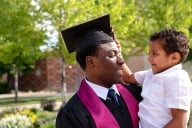You have /5 articles left.
Sign up for a free account or log in.
Just before the holidays, I started reading about the teaching power of stories. That's "stories" in the sense that probably first popped into your mind -- enthralling tales of interesting characters facing challenges in pursuit of a goal. Children learn to understand pattern, cause-and-effect, motivation, etc., not by having these things explained to them in some form of abstract exposition -- children learn these things (and many more) by seeing/hearing/vicariously experiencing them in action. Along the way, their brains learn to expect a certain sort of information in a certain form, and configure themselves to process and store such information efficiently. Memory works by story. Our lives work by stories.
While I'd long known through experience and anecdote that experiencing stories changes kids' lives, I only recently understood that kids who grow up on stories not only do better verbally, they also do better in math, science, and any type of formal logic. Stories are risk-free experiences in condensed form, and experience is a powerful teacher.
I began to wonder if I could use the power of stories to shape attitudes and expectations in Greenback's students. It's not clear to me that I can. Let me re-phrase that. It's clear to me that, at least at present, I wouldn't know how to. I grew up on stories, of course. I've told stories to my children, and my students, and to audiences at public gatherings. But almost all of the stories I grew up on -- almost all the stories I've told -- are based on the hero myth, one way or another. Variations on a theme by Orpheus. Individual protagonists (sometimes supported by a small group) striving (successfully or un-) to overcome obstacles. Testosterone-laden tales in the best Western tradition.
There are other sorts of stories, of course. Origin myths, many of them consistent with feminist theologies. The Jet Li movie "Hero". Doubtless there are others.
But the dominant narrative of our civilization seems routed in heroic myth, and any myth of any hero seems unlikely to reshape existing student expectations and perceptions -- themselves often rooted in hero myths. After all, a prominent subset of heroic myth centers on "human against nature". But the reshaping I hope to accomplish revolves around the fact that humanity is part of -- operates entirely within -- that supposedly external entity we've been taught to think of as "nature". (We've been taught in large part, of course, by stories.)
To teach sustainability within the heroic paradigm, then, the opponent can't be nature. As a result, any opponent has to be an identifiable, intelligent, malevolent agent. A cartoon-ish villian (cf., Captain Planet) won't suffice. And while real-world oppositional entities could certainly be identified, making powerful forces out to be villainous won't garner me a lot of friends. Or grant money. Or students who soon will face the challenge of becoming employed within the power structures that currently exist. Trying to teach sustainability concepts using variations on the heroic myth feels kind of like mounting a direct frontal attack on entrenched infantry which is backed by both artillery and unfettered air support. Not a particularly subtle (or survivable) strategem.
If there are inspirational, character-based stories (preferably, ones not featuring cute little talking furry animals) that demonstrate success via cooperation, facilitation and accommodation, I have to admit that I don't know where to find them. I wish I did.





